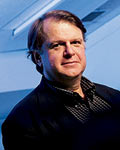 |

|
 |
Prof. John Baras |
|
Professor John S. Baras (ECE/ISR) recently participated in an invited presentation and discussion panel, organized and sponsored by MathWorks with the theme "Designing Better Control Systems with Computational Models." The panel was held on December 16, 2009 in Shanghai, China as part of the joint 48th IEEE Conference on Decision and Control (CDC) and of the 28th Chinese Control Conference (CCC). The moderator of the panel was Professor T. John Koo, Director of the Center for Embedded Software Systems, Shenzhen Institute of Advanced technology, Chinese Academy of Sciences. The other panelists joining Prof. Baras were Professor Roger Brockett of Harvard University (and ISR), Professor Christos Cassandras of Boston University, and John Glass of MathWorks.
Central to the theme of the panelists? discussion was that control system design has become highly partitioned, and that modeling the physics of the plant, synthesizing control laws, creating computational representations of these laws, designing supervisory control and safety precautions, and implementing different elements on a hardware architecture often occur in isolation. Partitioning design activities enables engineers to achieve highly optimized results for individual subsystems, but leaves them unable to optimize across domains. Today, the challenge in developing systems, and systems of systems, is embedding computation and communication in a physical environment. For these cyber-physical systems to meet rigorous performance requirements with limited resources, the walls between different activities in design must be eliminated. Panelists discussed how Model-Based Design can address this need, and shared their opinions about what advances in theory, methodology, and technology are needed.
Professor Baras?s presentation was entitled "COMPonent-based Architecture and System Synthesis (COMPASS)." In his presentation, Baras emphasized that as we move from a reductionist scientific approach to an integrative scientific approach, the fundamental challenge is to synthesize engineering systems so as to be able to generate predictable system behavior and performance by integrating behaviors and performance of system components, or what he has termed compositional synthesis of complex engineered systems. This compositional synthesis advances engineering to the next frontier, way beyond "plug and play synthesis." He explained that advances in IT make possible to accomplish this vision -- namely networked embedded systems. Through embedded systems the heterogeneity of the various physical components is translated into a common language where design can be integrated. Networked embedded systems have revolutionized cars, networks, energy, biology and many other fields; at scales from nano to macro. The implied programmability and re-programmability has immense consequences. He closed his presentation by presenting "A Vision: The Next Step in Computer-Assisted System Design." He described as key steps towards this vision the following:
? Enable component-based design and synthesis of complex systems (constrained components enable design flexibility)
? Create a ?desk-top? system synthesis tool
? Reduce current SE tool costs by several orders
? Capable to handle diverse system ontologies
? Have multi-physics capabilities
? Link to libraries of models for design re-use
? Heterogeneous component and time models
December 21, 2009
|

